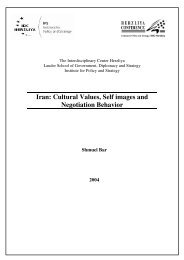Bashar's Syria: The Regime and its Strategic Worldview Shmuel Bar ...
Bashar's Syria: The Regime and its Strategic Worldview Shmuel Bar ...
Bashar's Syria: The Regime and its Strategic Worldview Shmuel Bar ...
You also want an ePaper? Increase the reach of your titles
YUMPU automatically turns print PDFs into web optimized ePapers that Google loves.
Bashar’s <strong>Syria</strong> 411in their former apparatuses, using those links to plan <strong>and</strong> execute the assassination.This explanation has two alternative possibilities for a motive. <strong>The</strong> first is that theformer officials saw al-Hariri as a threat to their own personal influence <strong>and</strong> businessin Lebanon, as well as to <strong>Syria</strong>n dominance. <strong>The</strong> second possibility is that theysaw Bashar loosing his grip on Lebanon, <strong>and</strong> therefore wanted to create a situationthat would force him to revise what they saw as his inept policy. <strong>The</strong> flaw in thisexplanation is that most of the “old guard” with influence in Lebanon (such as thelate Ghazi Kana’an) are aware of the dynamics of the Lebanese arena <strong>and</strong> tend tobe cautious in the use of force that may incriminate <strong>Syria</strong>. <strong>The</strong> continued attemptsto assassinate lower-level critics of <strong>Syria</strong> after the murder of al-Hariri also raise thequestion of why, if the cause is “loss of control,” the regime had not taken any visiblesteps to reign in <strong>its</strong> “loose cannons.”<strong>The</strong>re is no doubt that there was deep <strong>Syria</strong>n involvement in the assassinations. <strong>The</strong>question is the extent of Bashar’s involvement in the affair, <strong>and</strong> what can be learned from itregarding his leadership style. Bashar’s personality <strong>and</strong> the decision-making process underhim does not support the account of his personal involvement in ordering the assassination.Rather, his aversion to political risk on one h<strong>and</strong>, <strong>and</strong> tendency to delegate authority on theother, tends to support the first explanation of “overdelegation of authority.”If this is true <strong>and</strong> senior intelligence officials set in motion one of the most disastrousblunders in the history of <strong>Syria</strong>n intelligence operations, the circumstances of the affairwould have warranted, in such an autocratic regime, either a genuine purge of the apparatusor apparatuses that acted against the policy of the president, or, at least, a bid to disengagethe president himself from responsibility by claiming that the <strong>Syria</strong>n involvement was thepersonal initiative of a mid-ranking official who has been duly punished. This latter wasthe image that Hafez al-Asad tried to project after the Hindawi affair of 1986, when he(temporarily, at least) moved aside those who were known to have been involved in theoperations attempts. However, the only senior figure to have been moved aside after theassassination was Bahjat Suleiman, <strong>and</strong> there is no evidence to date—<strong>and</strong> certainly noofficial declaration—that his dismissal was linked to the assassination.<strong>The</strong> development of the Lebanese situation offers additional insight into Bashar’s decisionmaking. <strong>The</strong> Lebanese case is particularly instructive, as Bashar had received his“apprenticeship” in politics in this theater. From the mid-1990s Bashar appeared to be informallyresponsible for the “Lebanese file” as Vice President Khaddam became more <strong>and</strong>more marginalized. He developed close ties with various members of the Lebanese elite(he was said to be close to Suleiman Tony Franjiya, the gr<strong>and</strong>son of former pro-<strong>Syria</strong>nLebanese President Suleiman Franjiyeh) <strong>and</strong> was deeply involved in <strong>Syria</strong>n manipulationof the Lebanese political scene, including the replacement of Prime Minister al-Hariri, whowas associated with Khaddam, <strong>and</strong> the <strong>Syria</strong>n Chief of Staff, Hikmat Shihabi by Salimal-Huss. 136 Pressure on <strong>Syria</strong> to withdraw from Lebanon began after the Israeli withdrawalin May 2000. <strong>Syria</strong>’s initial response to this pressure was in line with <strong>its</strong> traditional modusoper<strong>and</strong>i in that country: it supported Hezbollah’s claim that the Sheba farm area (occupiedby Israel with the Golan Heights in June 1967) was part of Lebanon, <strong>and</strong> therefore Israelhad not implemented a total withdrawal <strong>and</strong> the raison d’être for Hezbollah’s resistanceremained in force.As pressure mounted on <strong>Syria</strong> to withdraw, the conventional wisdom, grounded in thestrategic significance of Lebanon for <strong>Syria</strong> (see above) <strong>and</strong> the behavior of Hafez al-Asad,assumed that Bashar’s <strong>Syria</strong> would first procrastinate <strong>and</strong> buy time, then create a crisis thatwould put the call for an early <strong>Syria</strong>n withdrawal on the back burner, <strong>and</strong>, finally, perform a
















